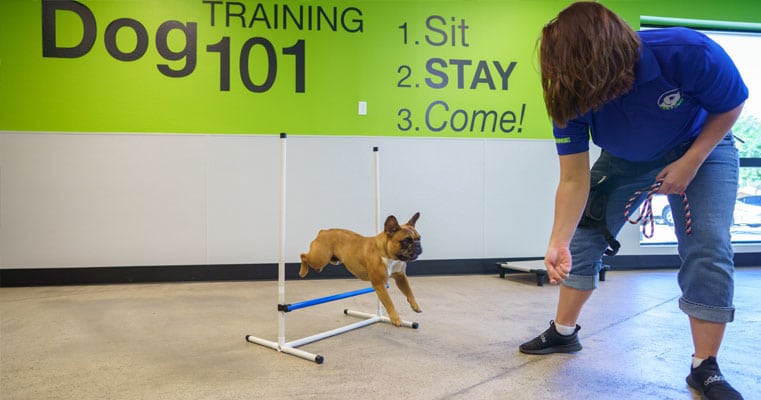The Ultimate Overview to Pet Dog Training: Building a Happy, Loyal Animal
Effective dog training is a complex process that pivots on a deep understanding of canine behavior and the application of proven strategies. By welcoming favorable support and regular command usage, pet owners can grow not only obedience yet also a solid, trusting partnership with their pets.

Understanding Canine Actions
How does a pet dog's behavior show its psychological and mental state? A dog's actions can offer as a home window into its feelings, demands, and overall psychological wellness.
Body movement also plays an important duty in understanding canine habits. A loosened up posture and open mouth signal comfort, whereas strained muscular tissues and pinned ears might suggest anxiety or hostility. Observing these signals is crucial for identifying the root causes of a pet dog's actions, whether it originates from fear, excitement, or disappointment.
In addition, a pet's communication with its setting and various other pets can offer insight into its emotional state. As an example, a dog that involves happily with various other canines is likely feeling social and safe and secure, while one that shows evasion or hostility may be experiencing stress or insecurity. Recognizing these behavioral cues is essential for cultivating a strong partnership in between the owner and the pet, ultimately adding to the pet dog's emotional health and health.
Necessary Training Strategies
Efficient dog training strategies are vital for fostering preferable behaviors and reinforcing the bond between a pet and its owner. Making use of positive support is one of one of the most effective approaches, where rewards such as deals with, praise, or playtime are offered to strengthen wanted behaviors (Dog training). This motivates the pet to repeat those actions, creating a positive understanding environment
Uniformity is another vital component in canine training. Commands must be uniform and clear, and all relative should use the very same guidelines to stay clear of confusing the canine. Timing is similarly vital; rewards must be offered instantly after the desired habits to develop a clear link in between the activity and the benefit.
In addition, appealing and short training sessions are reliable, as pets have varying attention spans. Go for sessions of 5 to 15 mins, relying on the dog's age and energy level. Incorporating play into training can likewise improve inspiration and satisfaction for both the pet and the proprietor.
Lastly, patience is essential. Canines discover at their own speed, and preserving a calm behavior will certainly assist minimize irritation, making certain a favorable training experience. These crucial strategies prepared for effective pet dog training and an unified connection.
Basic Commands to Instruct

Uniformity and positive reinforcement are vital when instructing these commands. dog training charlotte nc. Usage deals with, appreciation, and playtime to reward your canine's successes. Short, regular training sessions are extra effective than long, irregular ones. By instilling these fundamental commands, proprietors outfit their pets with the abilities necessary for a harmonious and well-behaved connection.
Dealing With Typical Behavioral Issues
Understanding and addressing usual behavior problems in dogs is essential for cultivating an unified connection between pets and their proprietors. Lots of canines exhibit actions such as extreme barking, chewing, or aggressiveness, which can come from anxiety, dullness, or lack of proper training. Recognizing the source of these habits is the very first step toward effective treatment.
For example, too much barking might indicate a requirement for attention or a feedback to environmental stimuli. In such situations, owners need to evaluate the pet's setting and give appropriate mental excitement, such as interactive playthings or normal exercise. Eating can frequently be taken care of by redirecting the actions to suitable eat items and making certain that the canine has enough physical activity to lower boredom.
Hostile behavior needs mindful handling and may require specialist training support. It's critical to understand that penalty can exacerbate stress and anxiety and aggressiveness, resulting in a cycle of behavior concerns. Instead, concentrate on favorable support methods to compensate desirable habits and enhance a complacency.
Structure a Favorable Training Environment
Producing a favorable training setting is basic for reinforcing desirable habits in pet dogs and minimizing behavioral issues. This environment ought to be defined by uniformity, inspiration, and a clear understanding of the training purposes. By establishing a routine, dogs learn what is expected of them, which helps decrease stress and anxiety and confusion.
Using positive reinforcement methods, such Read Full Report as treats, praise, and play, promotes a sense of safety and security and motivation in the canine. Rewarding great habits right away and constantly strengthens the preferred actions, making the training process much more effective - dog training charlotte. In addition, instructors need to continue to be individual and calmness, as pet dogs are sensitive to their handlers' feelings
The training area need to be devoid of diversions to make sure the canine can concentrate on the tasks handy. Think about utilizing a quiet area or a safe and secure outside area. Moreover, including dog training bells petsmart play and socialization right into training sessions advertises an all-around approach, boosting the pet dog's knowing experience.
Ultimately, a favorable training atmosphere supports a strong bond in between the canine and trainer, causing an obedient, delighted pet. By prioritizing this setting, animal proprietors can efficiently resolve behavioral obstacles and cultivate an effective training journey.
Final Thought
Efficient pet training counts on a thorough understanding of canine actions and the application of favorable support techniques. Adopting these principles makes sure a satisfying training experience for both pets and their proprietors.
Reliable pet dog training is a complex process that pivots on a deep understanding of canine behavior and the application of proven techniques. A canine that engages playfully with other canines is likely feeling social and protected, while one that displays avoidance or hostility may be experiencing tension or insecurity.Effective canine training techniques are important for fostering desirable behaviors and reinforcing the bond in between a pet and its proprietor.Producing a positive training environment is essential for reinforcing desirable actions in pets and minimizing behavior problems.Effective dog training counts on a detailed understanding of canine habits and the application of positive support strategies.